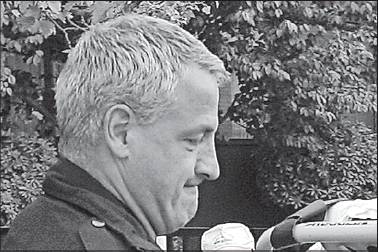JOURNAL INVESTIGATION
THE $243,000 FIREFIGHTER
Overtime pay played role in big payouts for many on the force in ’16
By Mark Reynolds Journal Staff Writer
PROVIDENCE — The city paid three Providence fire captains more than $200,000 each in 2016 and paid a total of 220 firefighters more than $100,000 apiece during the same period.
Fire rescue Capt. Vincent J. D’Ambra had the biggest payout, $243,000, according to a Providence Journal analysis of the Fire Department’s payroll, apparently making him the highest-paid employee on the city’s payroll.
A total of 29 firefighters brought home more than $150,000 in 2016, outpacing Mayor Jorge O. Elorza’s $131,300 salary.
The top three on the payroll, including fire rescue Capt. Zachariah Kenyon and fire Capt. Thomas L. Cassin III, each collected more than School Supt. Christopher N. Maher, whose salary is $203,000. The three fire captains’ base pay was $77,258 and $77,545.
The firefighters’ union and Public Safety Commissioner Steven M. Paré disagree about the specific reasons for the huge paychecks but it’s clear that the city had to pay large amounts of overtime to meet required staffing levels following a wave of retirements.
In no small part, the pay figures in 2016 signify the unconventionality of a highly unusual Fire Department personnel organization and shift schedule that emerged in August 2015 —after firefighters resisted the city’s initial proposal for a more conventional approach aimed at reducing overtime.
The city wanted to regroup the firefighters into three platoons from four, and also have them work a schedule of 24 hours on and 24 hours off. That’s a common arrangement for departments with three platoons, according to Paré.
But the firefighters refused to agree and their contract called for a 4-day work cycle encompassing two 10-hour days followed by two 24-hour days. And the city refused to back away from the three-platoon system, which had firefighters receiving two days of time off following each four-day cycle. Previously, the time off had been four days.
Firefighters union president Paul A. Doughty, said he warned Paré and others that the planned reorganization would create far more callback, a type of overtime for firefighters.
Doughty argues that a spike of retirements prior to the reorganization demonstrated the unpopularity of the change and pointed to the wave of retirements that followed. With fewer firefighters and a requirement to staff at a certain level, city officials should have recognized they were headed for whopping overtime payouts, Doughty said.
But Paré said the city couldn’t reasonably foresee that retirements would cut total staffing from 406 positions at the end of June 2015, to 338 positions at the end of 2016.
Also, he argues that reorganization would have eliminated callback — saving $5 million that had been budgeted for that expense — if the department had not lost about 100 firefighters after May 1, 2015.
Instead, Providence paid out even more callback, about $4 million more than budgeted in the fiscal year that began July 1, 2015, and ended June 30, 2016.
This put many firefighters in position to collect large amounts of callback. Paré acknowledges that some firefighters were forced to fill vacancies when they didn’t want to.
Based on their ranks, jobs and desire to work long hours, D’Ambra, Kenyon and Cassin stood to get the most, Paré said. The city paid Kenyon $216,000. And it paid $207,000 to Cassin, a fire captain who received more than $17,000 in extra pay for working as an acting battalion chief. Each of the captains declined comment for this article.
All three captains and their brethren in the fire service could earn even more for their work in 2016: Their union rejected the city’s argument that time worked over 42 hours per week did not constitute overtime unless the work hadn’t been scheduled ahead of time. An arbitrator could award the firefighters as much as $13 million to the firefighters, Doughty said.
As Paré analyzes the situation, he sees a different consequence of the reorganization:
Earlier this month, the firefighters agreed to a new contract. The language in that contract calls for a reduction in the number of firefighters required on each shift, from 94 positions to 88.
That language will help save the city money over the next five years and down the road, Paré said.
And the city negotiated the reduction by agreeing to return to the old four-platoon system.
